- Home
- Quizzes
- My Quiz Activity
- Newsletters
- Sports Betting
- MY FAVORITES
- Add Sports/Teams
- SPORTS
-
NFL
- NFL Home
- Arizona Cardinals
- Atlanta Falcons
- Baltimore Ravens
- Buffalo Bills
- Carolina Panthers
- Chicago Bears
- Cincinnati Bengals
- Cleveland Browns
- Dallas Cowboys
- Denver Broncos
- Detroit Lions
- Green Bay Packers
- Houston Texans
- Indianapolis Colts
- Jacksonville Jaguars
- Kansas City Chiefs
- Las Vegas Raiders
- Los Angeles Chargers
- Los Angeles Rams
- Miami Dolphins
- Minnesota Vikings
- New England Patriots
- New Orleans Saints
- New York Jets
- New York Giants
- Philadelphia Eagles
- Pittsburgh Steelers
- San Francisco 49ers
- Seattle Seahawks
- Tampa Bay Buccaneers
- Tennessee Titans
- Washington Commanders
-
MLB
- MLB Home
- Arizona Diamondbacks
- Atlanta Braves
- Baltimore Orioles
- Boston Red Sox
- Chicago White Sox
- Chicago Cubs
- Cincinnati Reds
- Cleveland Guardians
- Colorado Rockies
- Detroit Tigers
- Houston Astros
- Kansas City Royals
- Los Angeles Angels
- Los Angeles Dodgers
- Miami Marlins
- Milwaukee Brewers
- Minnesota Twins
- New York Yankees
- New York Mets
- Oakland Athletics
- Philadelphia Phillies
- Pittsburgh Pirates
- San Diego Padres
- San Francisco Giants
- Seattle Mariners
- St. Louis Cardinals
- Tampa Bay Rays
- Texas Rangers
- Toronto Blue Jays
- Washington Nationals
-
NBA
- NBA Home
- Atlanta Hawks
- Boston Celtics
- Brooklyn Nets
- Charlotte Hornets
- Chicago Bulls
- Cleveland Cavaliers
- Dallas Mavericks
- Denver Nuggets
- Detroit Pistons
- Golden State Warriors
- Houston Rockets
- Indiana Pacers
- Los Angeles Clippers
- Los Angeles Lakers
- Memphis Grizzlies
- Miami Heat
- Milwaukee Bucks
- Minnesota Timberwolves
- New Orleans Pelicans
- New York Knicks
- Oklahoma City Thunder
- Orlando Magic
- Philadelphia 76ers
- Phoenix Suns
- Portland Trail Blazers
- Sacramento Kings
- San Antonio Spurs
- Toronto Raptors
- Utah Jazz
- Washington Wizards
-
NHL
- NHL Home
- Anaheim Ducks
- Arizona Coyotes
- Boston Bruins
- Buffalo Sabres
- Calgary Flames
- Carolina Hurricanes
- Chicago Blackhawks
- Colorado Avalanche
- Columbus Blue Jackets
- Dallas Stars
- Detroit Red Wings
- Edmonton Oilers
- Florida Panthers
- Los Angeles Kings
- Minnesota Wild
- Montreal Canadiens
- Nashville Predators
- New Jersey Devils
- New York Islanders
- New York Rangers
- Ottawa Senators
- Philadelphia Flyers
- Pittsburgh Penguins
- San Jose Sharks
- Seattle Kraken
- St. Louis Blues
- Tampa Bay Lightning
- Toronto Maple Leafs
- Vancouver Canucks
- Vegas Golden Knights
- Washington Capitals
- Winnipeg Jets
- NCAAF
- NCAAM
- Boxing
- Entertainment
- Lifestyle
- Golf
- MMA
- Soccer
- Tennis
- Wrestling
- More Sports
- RESOURCES
- My Account
- YB on Facebook
- YB on Twitter
- YB on Flipboard
- Contact Us
- Privacy Policy
- Terms of Service
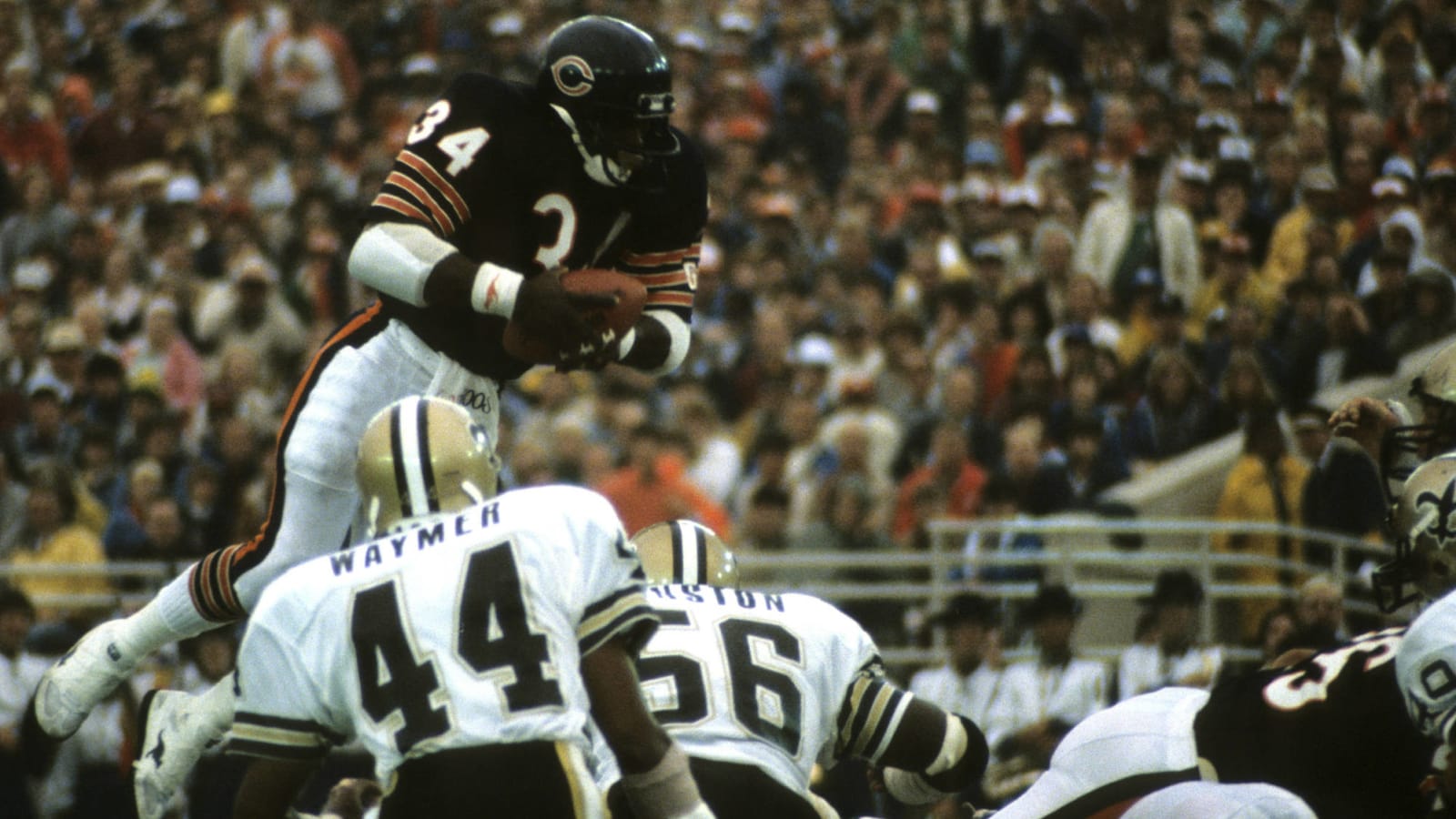
Walter Payton: Career retrospective
Walter Payton remains one of the most beloved players in NFL history. The Bears running back retired with nearly every record there was and set an off-field example that carries on to this day. So with that in mind, here is a look back at the career of one of the league's all-time greats.
Unlikely NFL path
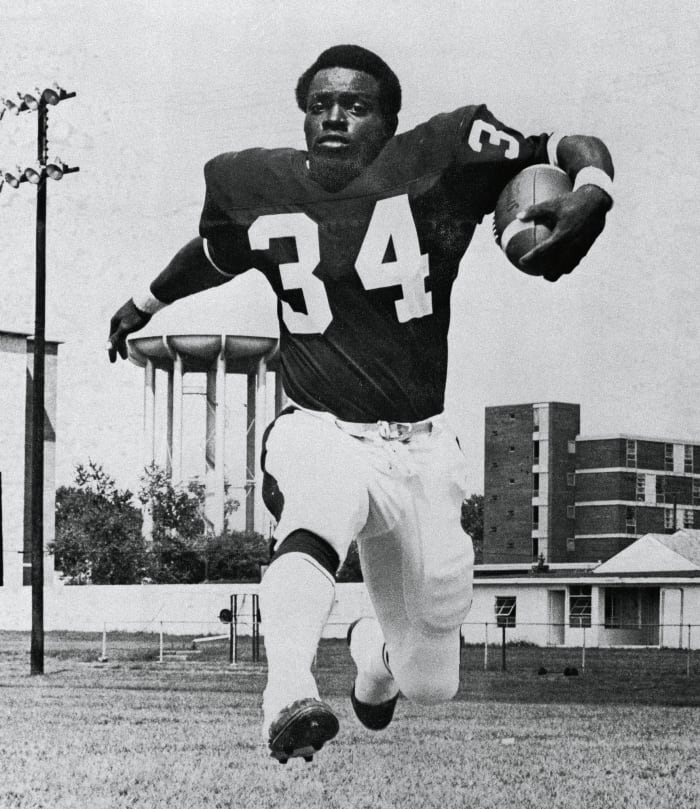
The Columbia, Mississippi, native emerged as a prospect out of Division I-AA Jackson State. No SEC offers came Payton's way, with the conference not accepting many black players in that era. He was set to trek to Kansas State, but instead, Payton followed his brother, Eddie, a fellow future NFLer, to the Southwestern Athletic Conference school. All he did there: score a then-Division I-record 464 points — including a 24-touchdown 1973 junior season — and launch himself onto the NFL radar. Payton also kicked for the historically black program, making 53 extra points and five field goals.
Bears land a legend

Injuries ended Gale Sayers' career early, and the Bears spent two first-round picks — Mike Hull (No. 16 overall, 1968) and Joe Moore (No. 11, 1971) — trying to replace him. Neither panned out. They tried again in 1975. It went better. Hull and Moore combined to rush for just 488 yards as Bears; Payton, the No. 4 pick in '75, became the longest-tenured running back in the Bears' 99-year history. The '75 draft produced three Hall of Famers in its first six picks — Randy White (No. 2 overall), Payton and his college teammate Robert Brazile (No. 6). The Bears landed the best player.
Chicago's original 'Flu Game'

No NFLer has held the single-game rushing record longer than Walter Payton. Sweetness amassed 275 yards on Nov. 20, 1977, doing so despite playing with a 101-degree temperature and his team lacking a passing attack. In the first half of Payton's masterpiece, Bears quarterback Bob Avellini completed one pass (to Payton) and handed the ball to the star tailback 26 times. This came weeks after Bears coach Jack Pardee yanked Payton early after he tied Sayers' team record (205 yards) in a game against the Packers. Payton's day (which ended with 40 carries) against the Vikings was the NFL record for 23 years — until Corey Dillon broke it with 277 yards.
MVP drags Bears back to playoffs

The 1977 Bears featured the NFL's No. 22-ranked defense and its No. 21 pass offense. They had Payton, though, and this was his masterpiece. The 23-year-old running back helped the Bears turn around a seemingly lost season. Chicago started 2-4 and was 3-5 after a 47-0 loss in Houston. Behind Payton, who rushed for 100-plus yards in each of the next five games (including the all-timer against the defending NFC champs), the Bears won their final six and booked their first playoff berth in 14 years. The MVP's totals: 339 carries, 1,852 yards, 14 rushing TDs, 5.5 yards per carry — all NFL-high figures that year.
Climbing the hill
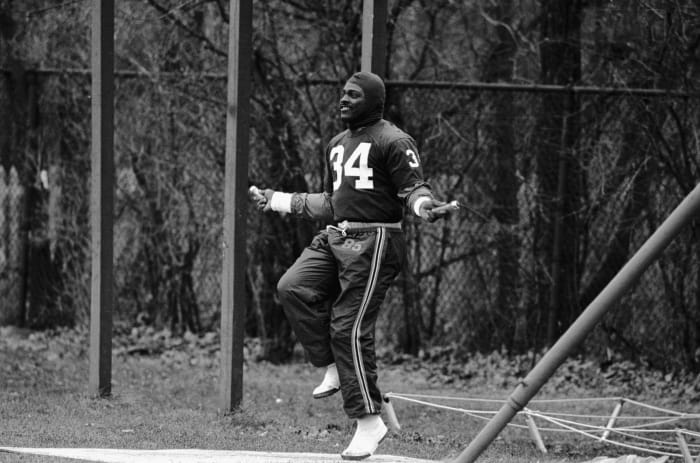
Payton retired miles ahead of his peers in rushing yards, but he logged an astounding touch total (4,330) in his 13-year career. The closest player from Payton's era to that mark, Tony Dorsett, finished with 721 fewer touches. Chicago's relentless runner created a body able to withstand this with maniacal training regimens — the most famous of which being countless sprints up a hill near a landfill in Arlington Heights, Illinois. While Jerry Rice used a hill as the centerpiece of his climb to football's mountaintop, Payton's training made him one of the most fearsome tackling assignments in NFL history.
18 yards of hell

This play defines Payton more than any. While his over-the-top touchdown dives and terrifying stiff-arms appear more often in montages, a Payton non-touchdown odyssey in 1977 best showcases what NFL defenders were tasked with stopping. The Bears' generational talent showed his elusiveness and vision on his famous run against the Chiefs, sure. But the punishing style — seen through the bulldozing of Hall of Famer Emmitt Thomas and Pro Bowler Gary Barbaro (after eluding Hall of Famer Willie Lanier) — allowed Payton to take on nearly an entire defense. It was only an 18-yard run, but it's one of the NFL's signature plays.
But ... the Bears: not as brilliant

Payton's prime did feature two playoff games — in 1977 and '79, both losses — but much of his 20s were spent anchoring forgettable Bears squads. Chicago cycled through ill-equipped QBs — from Gary Huff, to Bob Avellini, to Mike Phipps, to Vince Evans -— during Payton's first seven seasons. Years 8-9 brought the Jim McMahon-Mike Ditka combo, but even they didn't reignite the team overnight. The 1982 and '83 Bears did not produce winning seasons. Two years, 1981 and '82, ended without Payton Pro Bowl invites. Time was running out for the Bears to complement their leader.
At last, a championship opportunity
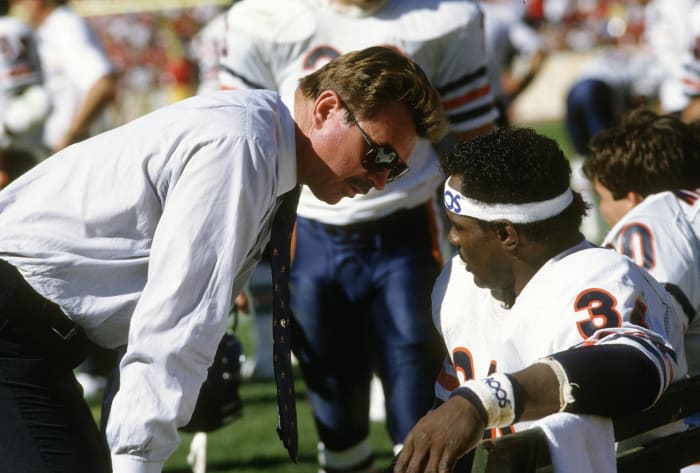
The Bears began to put relevant pieces around Payton. Buddy Ryan's 46 defense started to set records in the mid-1980s, and Jim McMahon and Willie Gault revitalized Chicago's long-dormant aerial attack. But Mike Ditka's dominant teams still funneled through Payton, whose 10th and 11th years ended in first-team All-Pro acclaim. Ditka's offense used Payton more as a receiver, and he totaled over 2,000 yards from scrimmage each year from 1983-85. These yards mattered a bit more, considering where the Bears' trajectory was headed.
Conquering the unconquerable
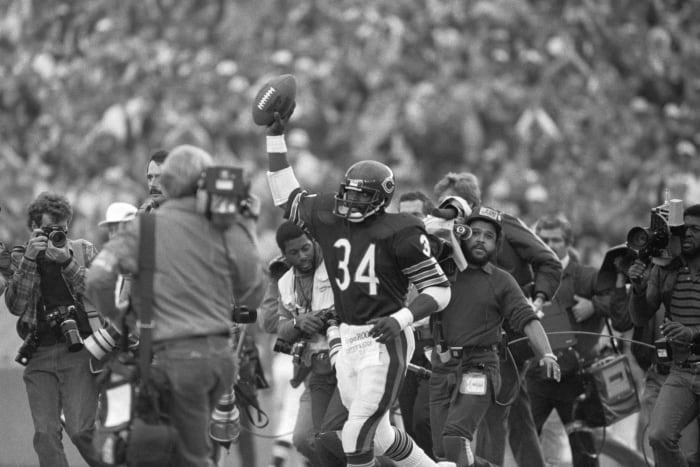
Upon coming into the NFL, Sweetness did not harbor a goal of breaking Jim Brown's career rushing record (12,312 yards), which had stood since 1965. The 30-year-old Payton entered 1984 needing nearly 700 yards to eclipse Brown's mark. Sitting in third place behind Brown and Franco Harris to start the season, Payton ripped off four straight 100-yard games going into Week 6. His first carry of the second half halted that October game at Soldier Field (and included one of history's signature high-fives). It took Payton 18 more games to get there than it took Brown (136), but none of his contemporaries finished even close to his career total.
A reluctant Shuffler
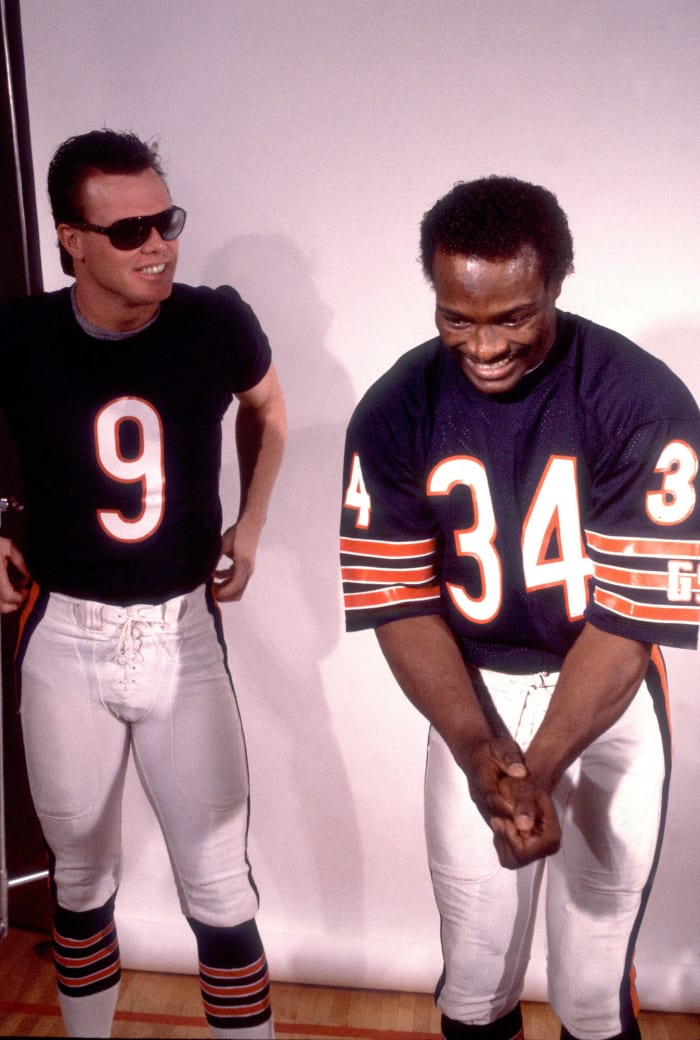
Things went quite well for the 1985 Bears, perhaps the most celebrated team in NFL history. The 31-year-old Payton was not the zaniest of Chicago's characters that year, but of course he delivered a few bars in the "Super Bowl Shuffle." The Bears made this video midseason, and while most of the one-time-only rappers did their verses with the team, Payton and Jim McMahon were initially skittish about the idea. The Bears' two stars did contribute lines at a later date for what was easily the most memorable video during an era featuring several NFL rap forays. Payton's verse led off the track.
An imperfect coronation

The '85 Bears stormed through what may be the most dominant playoff run in NFL history, outscoring the Giants, Rams and Patriots 91-10 — the only touchdown allowed coming in the fourth quarter of Super Bowl XX. The Patriots were determined not to let Payton beat them; he finished with 61 yards on 22 carries. While Mike Ditka has for a generation tried to answer why McMahon, Matt Suhey and William "The Refrigerator" Perry finished with rushing touchdowns without the signature Bear scoring one, Sweetness finished with 2,272 yards from scrimmage and 11 TDs that season and was a driving force for a legendary team.
End of the line

Chicago's would-be dynasty never materialized. Injuries to McMahon, and being in the most loaded era for NFC football, limited a stacked Bears nucleus to one title. Payton's penultimate season, 1986, produced his ninth Pro Bowl honor, but by '87, eventual successor Neal Anderson had cut into his workload. Sweetness retired after that strike-shortened season, one that ended with the Bears again losing a home divisional-round game to the Redskins. Payton finished with a career-low 533 rushing yards that season.
Miles above his contemporaries

While O.J. Simpson and Eric Dickerson enjoyed record-breaking seasons, Payton lapped them in career milestones. Of any back in his era, Payton's 16,726 rushing yards are nearly 3,500 more than the next-closest player's total (Dickerson). The mark still sits second all time, and with the way backs are used today, it may be there a while. The durable Bears icon's 4,538 receiving yards (still fourth in Bears history) gave him 21,264 from scrimmage. That is third all time, but among anyone in Payton's era, that total is a staggering distance (nearly 4,000 yards) north of all of them.
Sweetness goes to Canton

Like Brown before him, Payton cruised to first-ballot Hall of Fame enshrinement. Presented by his then-teenage son Jarrett, who would go on to play at Miami and briefly for the Tennessee Titans, Payton joined the likes of Bill Walsh and Chuck Noll as 1993 inductees. He retired with league records for single-game and career rushing yardage, career yards from scrimmage and career rushing touchdowns (110). After Sweetness retired, his rushing yardage total eclipsed everyone else by 4,414 — far more than Brown's lead on his competition when he left the game 22 years earlier.
A run at ownership

In 1993, the NFL decided to expand. The two new franchises would bring the league's total to 30. Payton held a significant stake in the St. Louis bid. With the city considered a strong bet to land one of the new teams, Payton would have become the NFL's first black owner had the bid been approved. A squabble between other members involved with St. Louis' pursuit led to the NFL nixing this reality, depriving the league of the St. Louis Stallions and Payton of a major post-playing role. Instead, Carolina and Jacksonville were chosen as the NFL's 29th and 30th franchises.
An NFL tragedy
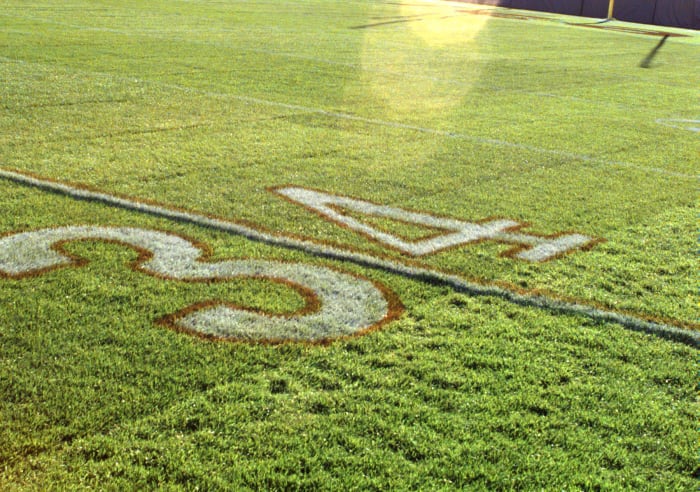
Walter Payton died on Nov. 1, 1999, at age 45. He announced in an emotional press conference that February he had primary sclerosing cholangitis, a liver disorder. It was not revealed until after Payton's death he was diagnosed with bile duct cancer. An outpouring of respect came for one of the most revered players in NFL history that week, with leaguewide tributes taking place. Payton's family, friends, teammates and tens of thousands of fans came to a Soldier Field ceremony held the day before a Bears road trip to Green Bay. The Bears then upset the Packers thanks to what became a celebrated blocked 28-yard field goal.
Perhaps his defining legacy

Shortly after Payton's death, the NFL renamed its Man of the Year Award in his honor. The award, given to the player voted as having the most significant impact in his community, has been in existence since 1970. Payton was the recipient during his 1977 MVP season. For the past 20 years, the winners have received the Walter Payton Man of the Year Award. Each year, Payton's widow, Connie, joins the previous year's winner and several prominent NFL figures in deciding which player will receive that year's honor.
The best ever?

In debates over the NFL's greatest running back, Payton is perpetually on short lists. While Emmitt Smith is the only player above him on the yardage list, the conversation generally centers around Payton, Jim Brown and Barry Sanders. The latter would almost certainly have broken Payton's record had he played past age 30, and Brown (eight rushing titles) towered over the game during his time. Payton's longevity (186 straight games), ferocious playing style and a post-age-30 stretch bettering that of his top competitors for this distinction place him in these debates. That status likely will not change for a long time.
Sam Robinson is a Kansas City, Mo.-based writer who mostly writes about the NFL. He has covered sports for nearly 10 years. Boxing, the Royals and Pandora stations featuring female rock protagonists are some of his go-tos. Occasionally interesting tweets @SRobinson25.
More must-reads:
- Winners and losers from Day 2 of the 2024 NFL Draft
- Eagles move up in draft to select another DB
- The '100 catches in an NFL season' quiz
Breaking News
Customize Your Newsletter
 +
+
Get the latest news and rumors, customized to your favorite sports and teams. Emailed daily. Always free!
Use of this website (including any and all parts and
components) constitutes your acceptance of these
Terms of Service and Privacy Policy.

